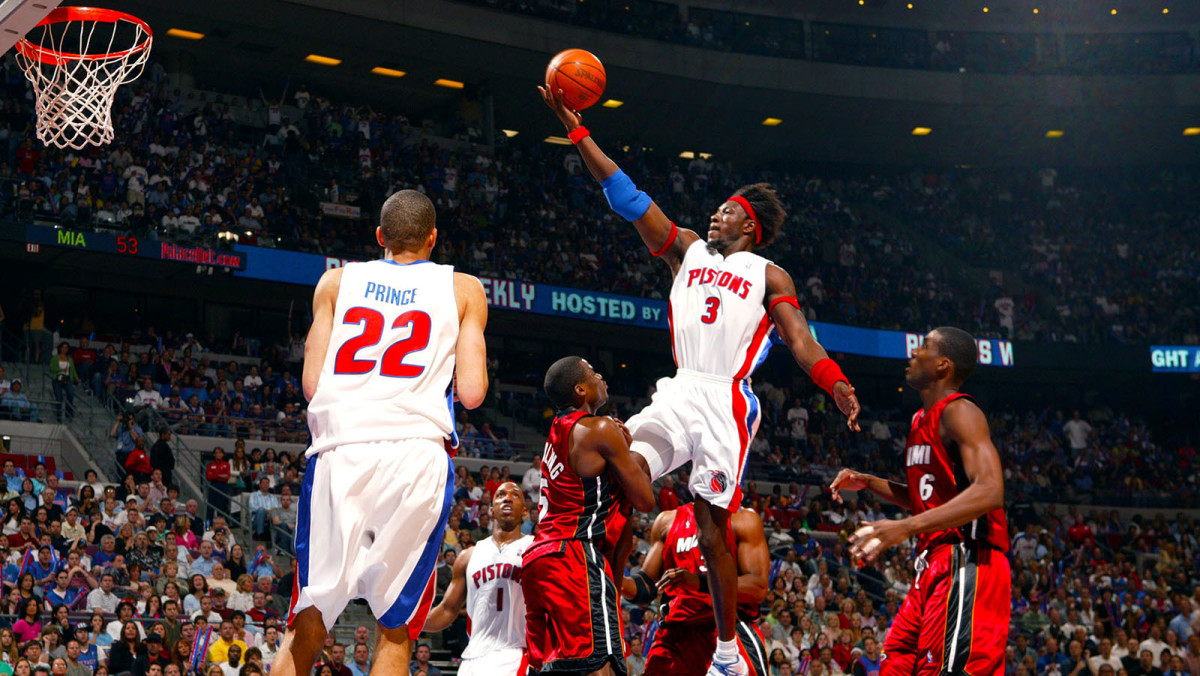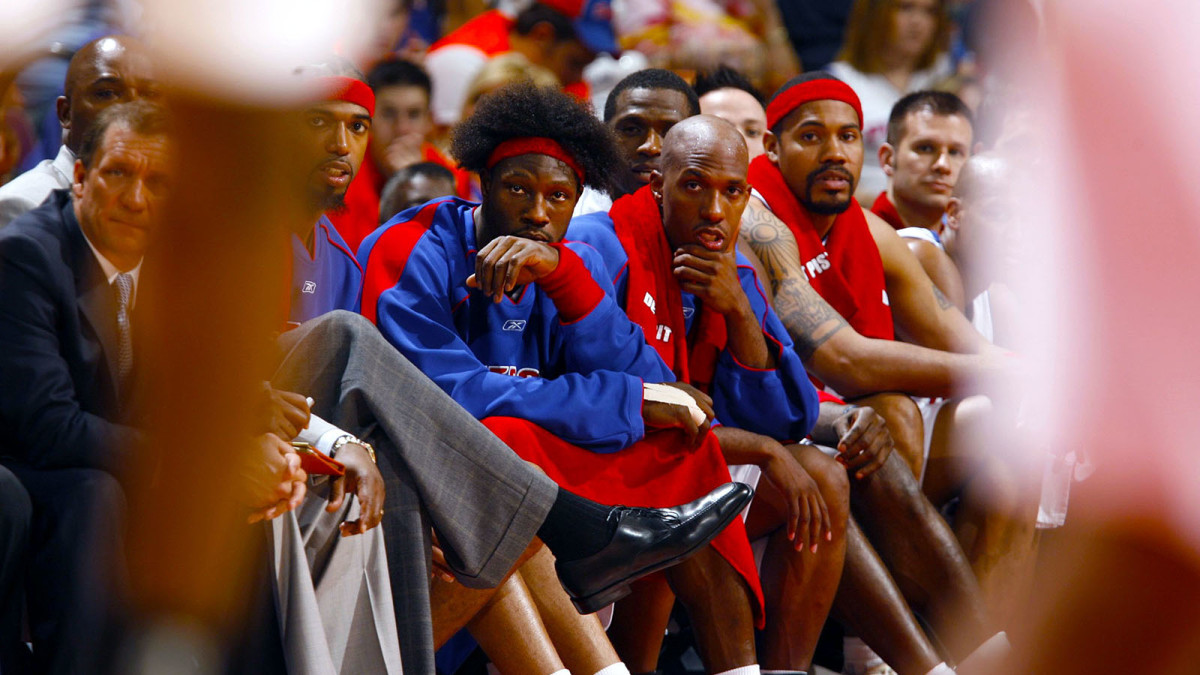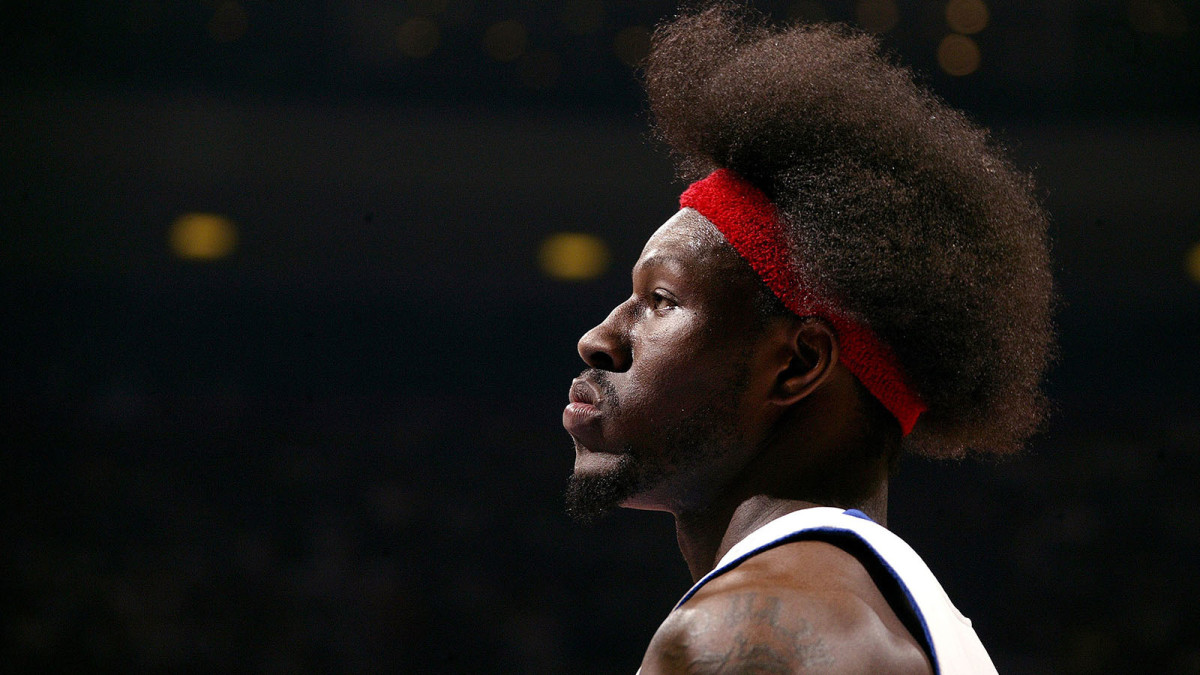‘I Started From the Bottom and Became a Winner’: Ben Wallace’s Journey Is Hall of Fame–Worthy

Before he became a force of nature on the hardwood, Ben Wallace experienced working on cotton fields in the sweltering backwoods of Alabama.
Wallace grew up in White Hall, a small town named after a plantation in the state’s ninth-poorest county (Lowndes County) with a current population of fewer than 750 people and a poverty rate of 37%. It was a place where he and his family—Wallace is the 10th of 11 children—depended on neighbors to make it.
“I saw a lot of things. I witnessed the plantation, I went to it, I worked on it. I experienced a lot of things that made growing up in the South priceless,” Wallace says.
“One or two wrong turns where I’m from could put you on a path that’s hard to reverse. … We had to stick together to get through down South.”
Wallace recalls one day that helped set his course. He was sitting on the couch inside his mother’s house when his oldest brother—James McBride Sr.—pulled up outside in his car with a pile of basketball uniforms he had purchased from a thrift store. The jersey read “Eastern Exchange” on the front of it. “The name on the jersey had nothing to do with my school’s mascot or anything that I knew,” Wallace says with a laugh. McBride told his little brother he was going to put together a makeshift team to play against others in the community.
At the time, Wallace was not into basketball, but he wanted a jersey, and he wanted to play with his brothers.
“With me being the youngest, they looked at me like I was the weak link … like I was supposed to just chase rebounds or something,” he says.
Wallace, who is known for his quiet demeanor, let his play speak for itself. Not only did he begin to dominate his brothers, but he started on an unexpected basketball journey—one that will be honored this weekend when he is inducted into the Naismith Memorial Basketball Hall of Fame.
It’s something Wallace never could have imagined growing up.
“When I became king on the court against my brothers, they stopped playing with me,” Wallace says. “When I started to learn the game, play the game and appreciate the game, I knew I had a chance to be good at it.
“But the Naismith Hall of Fame, that’s not something you prepare for. That’s taboo. You don’t go to the playground saying, ‘I’m going to be a Hall of Famer.’ It was the furthest thing from my mind.”
The road to stardom wasn’t easy for Wallace, who will be the first undrafted player in modern NBA history to enter the Hall. After playing one year of basketball at Central High School, Wallace didn’t receive any scholarship offers. He ended up playing two years at Cuyahoga Community College in Cleveland from 1992 to ’94, averaging 17 points and 6.9 blocks per game, then transferred to Virginia Union University, a small HBCU, to play for legendary Panthers coach Dave Robbins.
“Wallace was not a real exotic guy,” says Robbins, who is often referred to as “White Shadow” for being the first white coach in Central Intercollegiate Athletic Association history. “He was extremely agile and would stay on his feet until opposing players would go up for a shot and would then block it.”
While Wallace fell short of leading the Panthers to a national championship, he—along with the help of his teammates, including current VUU basketball coach Jay Butler—guided the Panthers to the Division II Final Four during his senior year. Wallace was named First-Team All-CIAA and a D-II First Team All-America that season.
“Ben was a grown man in the way he dominated the game. A center at 6' 7" with a great basketball IQ and chiseled. … He looked like a football player with the footwork of a guard,” says Butler, who also mentioned Wallace was a popular barber on campus.
“He was one of the hardest workers I played with.”
SI Vault: JACKIE MACMULLAN'S DRAFT PICKS
Following his senior season, Wallace waited anxiously to hear his name called in the 1996 NBA draft, but it never happened. Instead, his dreams of playing on the big stage took a slight detour to Italy, where he tried out for Viola Reggio Calabria.
“I was very disappointed when he didn’t get drafted,” Robbins says. “Scouts would look at D-II and thought II meant second class, when it was only a smaller school. I knew if somebody gave him a chance, he was going to play hard and impress them.”
Wallace saw the overseas experience as an opportunity. “I learned how to play the game without using my athletic abilities while playing overseas,” he says. “When I got my NBA opportunity, it enhanced my fundamentals.”
He joined the Washington Bullets later that year as a free agent. After three seasons in Washington, he was traded to the Magic. A year later, in 2000, he was traded to the Pistons. Each part of his journey he viewed as a stepping stone.
“Washington helped me learn the game. Orlando gave me the opportunity to fight for a starting position and gave me the confidence to know I could compete in the NBA,” Wallace says.

“In Detroit, I had a bond, a brotherhood with a group of guys. We stuck together. The bond we shared got us over the hump plenty of nights. We were the definition of true champions.”
The brotherhood Wallace shared with his Pistons teammates, including Chauncey Billups, Richard Hamilton, Tayshaun Prince and Rasheed Wallace, was special. And, under the guidance of coach Larry Brown, they won a championship together, defeating the Kobe-and-Shaq-led Lakers squad in five games in the 2004 Finals.
“I think a lot of people take for granted how good this team was, winning a championship using a completely different style. Holding NBA teams with NBA players and coaches under 70 points at times was unbelievable and unheard of,” says Wallace, who averaged 10.3 points, 14.3 rebounds and 2.4 blocks in the 2004 Finals.
“We did not have individual superstars, we had five superstars who knew how to play like a team.”
Lindsey Hunter, a player on the Pistons’ championship team with Wallace, said Big Ben was the anchor and leader on that Detroit team.
“The cameras might have gone to Chauncey [Billups], but Ben was the heart and soul of the team,” says Hunter, who was from Mississippi and shared that “Southern boy” connection with Wallace.
“We went at each other’s necks, and practices were probably 10 times as fierce as games,” Hunter says. “You would come out of practice with your shirt ripped off, scratches on your arm, bruised up. I remember when we drafted Darko Miličić, and Ben would not let the poor kid get a shot off. He never took it easy on anybody. Ben was something I had never seen.”
Billups says Wallace’s grit was also a great fit in Detroit.

“There was this commonality between us before we all got to Detroit that we were all kind of given up on or forgotten with our previous teams,” Billups says. “When we all got together, we tried to prove that while everybody threw us away, we had this level of greatness.
“And with Ben, this team provided a glimpse of what the city of Detroit was all about, a blue-collar city where people worked hard and earned everything. … When he battled with Shaq, there’s no stopping Shaq from his dominance. Shaq was the most dominant player I had ever seen at his position. But Ben held his own, guarded him straight up and sacrificed like none other.”
In 2006, Wallace was rewarded with a four-year, $60 million contract with the Bulls. While leaving Detroit was a difficult decision, he had the support of his Pistons teammates. “As much as I loved him and loved playing with him, I told him he had to leave because he earned it and deserved more for all he had done here,” Billups says.
“It was a time in my career where I had to take that journey again,” says Wallace, who would also spend a season in Cleveland with a budding superstar named LeBron James. “All the goals I set for myself in Detroit, going from a no-name to an NBA champion, I earned with my teammates.
“If business would’ve been handled differently, I would’ve never left. But it worked out perfectly because it humbled me and helped me reinvent myself. It showed me that I didn’t need people cheering and screaming to appreciate me.”

The four-time NBA Defensive Player of the Year returned to Detroit in 2009. He played three more seasons before retiring as a Piston in ’12. Afterward, Wallace said he went through a phase of depression. No longer were the bright lights shining down on the massive Afro, braids or iconic headband he wore while rocking the No. 3, 4, 6 or 30 on the back of his jersey. He was struggling to figure out what was next.
“For my entire life, my schedule had been planned out day by day,” Wallace says. “I realized while I thought I was coming home to spend more time with friends and family, they were out working.”
But he eventually found a way back into basketball. Wallace got an opportunity with the NBA G League as a minority owner of the then Grand Rapids Drive (now Grand Rapids Gold) in 2018 and currently serves as a special adviser to the Pistons.
Wallace says his work in NBA leadership is just beginning. As the last HBCU player to play in an All-Star Game, Wallace wants to help HBCU athletes get more access and opportunities to play in the NBA. Currently, the Trail Blazers’ Robert Covington (Tennessee State) is the only HBCU player on an active roster.
“I will be forever known as the first undrafted player to be inducted into the Hall of Fame, but hopefully I’m not the only,” Wallace says. “We have been doing it with a little or no help, but the spotlight is on HBCUs.”
In Wallace’s eyes, his enshrinement into the Hall of Fame and the moves of his peers taking coaching jobs at HBCUs means that it is time to change the narrative. Three of Wallace’s former teammates—Mo Williams (Alabama State), Hunter (MVSU) and Butler (VUU)—coach at HBCUs.
“Seeing Ben go to the HOF gives players a shot that with hard work they can attend an HBCU and still make it to the league,” Butler says. “Even if it is not on the court but in the front office working with former pros, it’s a life-changing opportunity where they could potentially provide for their future family.”
As he prepares to deliver his Hall of Fame speech and bask in the moment of the sport’s highest accomplishment, Wallace is at peace knowing he left everything he had for the game on the court throughout his 17-year playing career.
“It is an exciting moment for me and my family. … It’s one of those days where it is my testimony that anything is possible,” says Wallace, who turned 47 on Friday. “We all have a talent, but it takes some of us a little longer to find out what their talent is. ...
“Hoop dreams die hard if you don’t give the game your all. It’ll haunt you for the rest of your life. I started from the bottom and became a winner. Some things went wrong and could have been worse, but I stayed on the path. People think being 6' 9" and guarding 7-footers was the toughest part of my journey. No, that part wasn’t nearly as tough as what I had to do to get to that point.”
Wallace was inducted into the Alabama Sports Hall of Fame in May. It was on that trip that he got the call from the Basketball Hall of Fame. Surrounded by his wife, Chanda, and his three children—Ben Jr., Bryce and Bailey—he was given the news he’d waited years for.
But the biggest stamp of approval came from his daughter Bailey, who, upon hearing the news, watched highlights of her dad. She wanted to make sure he wasn’t, according to Wallace, “a bum on the court.”
“She’s going to ninth grade this year and she was watching clips of me playing with her friends and that’s when she realized she had something to dress up for because I was good,” Wallace said with a laugh. “I’ve been certified, approved and can walk into the Hall of Fame a happy man.”
More NBA Coverage:
